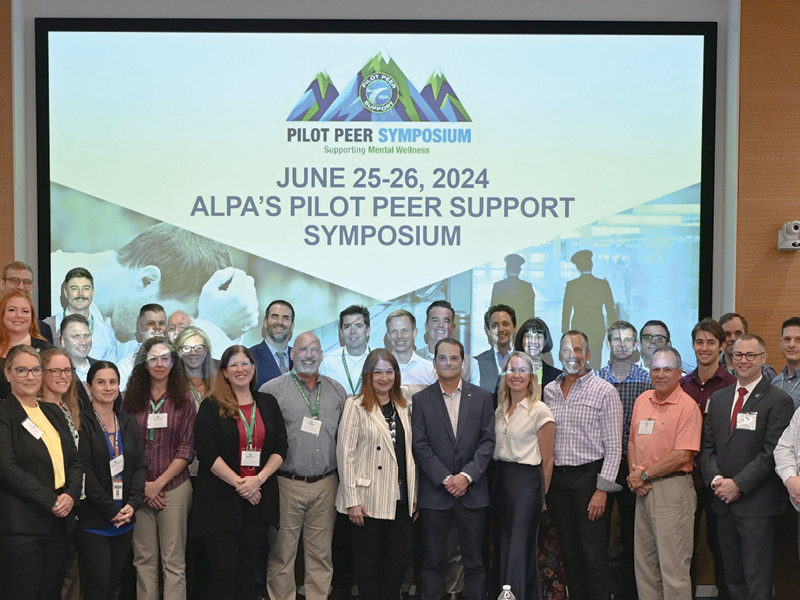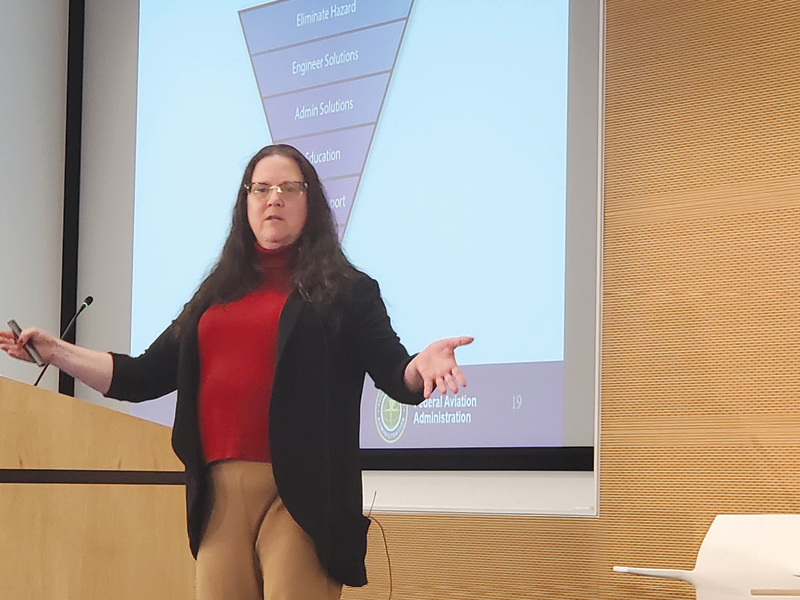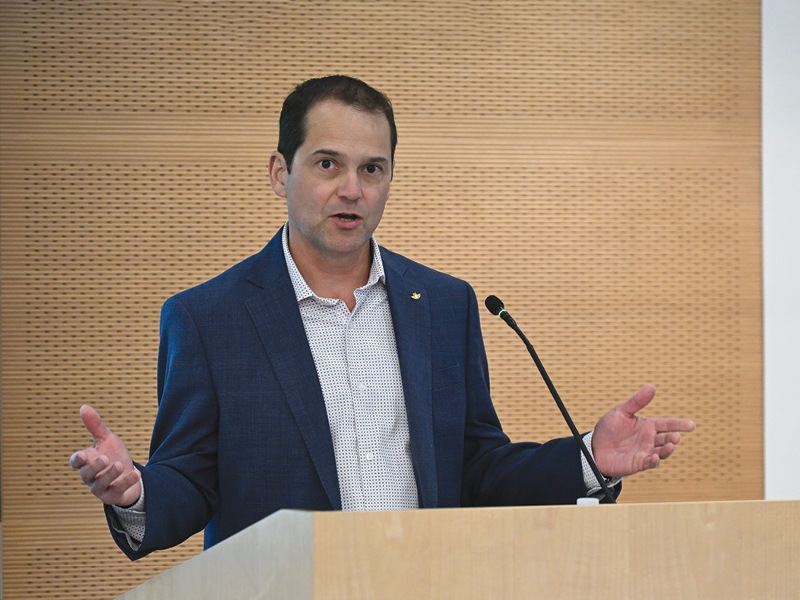ALPA’s Pilot Peer Support Symposium
Helping Pilots Navigate Personal and Professional Challenges
By Gavin Francis, Senior Aviation Writer

More than 60 pilot volunteers and mental-health experts gather at ALPA’s McLean, Va., offices for the Association’s two-day Pilot Peer Support Symposium.
Pilots convened at the Association’s McLean, Va., offices on June 25–26 to participate in ALPA’s Pilot Peer Support (PPS) Symposium. More than 60 attendees gathered for the conference, with representatives from 11 of the Association’s pilot groups. Attendees heard from speakers and panelists about various programs and mental-health topics that will help peers support pilots who experience challenges that may affect their job performance.
F/O Carrie Braun (JetBlue), ALPA’s Air Safety Organization (ASO) Pilot Peer Support Group chair, moderated the two-day symposium, which showcased the “Are You in the Green?” campaign, the Association’s recent mental-health awareness initiative to encourage pilots to monitor their fitness for duty, ease their concerns about seeking assistance for mental-health and wellness issues, and provide information about resources available to them. The campaign launched in May to coincide with Mental Health Awareness Month and includes an informational website at alpa.org/green.
The symposium took place after months of recent work by ALPA volunteers to promote mental-health awareness, including participation on the FAA’s Mental Health and Aviation Medical Clearances Aviation Rulemaking Committee (ARC). Capt. Travis Ludwig (United), ALPA’s ASO Pilot Assistance Group chair, served as cochair of the ARC. The Association’s longtime aeromedical advisor, Dr. Quay Snyder, also participated. The ARC published its final report on April 1 with a number of recommendations championed by ALPA.

Dr. Susan Northrup, the FAA’s federal air surgeon, discusses the agency’s commitment to addressing concerns regarding reporting mental-health issues.
“ALPA has a long history of supporting pilots who are confronted with a myriad of work-life balance issues,” said Capt. Wendy Morse, the Association’s first vice president and national safety coordinator. “Our volunteers are trained and ready to support our members in their wellness so they can maintain their position on their respective airline seniority list and on the flight deck.”
Morse went on to note ALPA’s success in lobbying for provisions included in the recent FAA reauthorization that support pilot mental-health initiatives. The Association’s volunteers, Government Affairs staff, and the union’s leaders worked hard to ensure those provisions made it into the final draft of the legislation.
“The FAA reauthorization bill that was just passed into law provides an excellent indication of the positive influence ALPA has in guarding the safety of our industry and the well-being of our pilots,” Morse remarked. “The recognition and importance of pilot health and well-being in all respects made its way into language that further advances the initiatives that this group so strongly and tirelessly advocates for.”
Capt. Jason Ambrosi, ALPA’s president, also emphasized the importance of the recent legislation and acknowledged the critical role of PPS volunteers in supporting the mental health of their fellow pilots. “What you all do behind the scenes is so important to the success of our organization and to the health of our members. What we did on the FAA reauthorization and the mental-health component, having that language in the bill, was essential to these reforms. We need to continue that advocacy, continue pushing forward to destigmatize the conversation around mental-health issues, and make sure that when a pilot needs to talk, there’s somebody there to listen.”

Capt. Jason Ambrosi, ALPA’s president, addresses Pilot Peer Support volunteers, recognizing them for their advocacy and the crucial support they provide to fellow pilots.
Dr. Susan Northrup, the FAA’s federal air surgeon, spoke to attendees about education, early intervention, and evolving standards, the three areas in which she believes improvements can be made to change the perception within the aviation community about mental-health issues. “At any given time, between 20 and 25 percent of U.S. adults have a mental-health condition that could be diagnosed,” said Northrup, “and roughly 50 percent will experience some form of mental unwellness at some point in their life. It’s important that we get these people the help they need and find ways to help them become more resilient in the way they respond to adversity. From the time that a young person first looks up into the sky, sees an airplane, and says, ‘Wow, I want to do that someday,’ we need to be talking to them about mental wellness.”
According to Dr. Erin Romero, the National Posttraumatic Stress Disorder (PTSD) Program manager in the Veterans Administration Office of Mental Health, about 60 percent of men and 50 percent of women will experience a serious traumatic event during their lifetime. “But not everyone who experiences a traumatic event will develop PTSD,” said Romero. There is a natural process of recovery that most people undergo. “When we think about PTSD, we’re talking about something that has gotten in the way of that natural recovery process.” Because the job of an airline pilot can involve high-stress situations and the potential for traumatic events, pilots can be susceptible to posttraumatic stress. Romero shared information about recognizing symptoms, different courses of treatment, and what resources are available.
Capt. Wanda Finch, a health services officer with the U.S. Public Health Service and an expert for the Substance Abuse and Mental Health Services Administration (SAMHSA), gave a presentation based on her work within the Office of Recovery. “The idea behind the Office of Recovery was to bring together the voices of our mental-health and substance abuse communities to drive the overarching goals and objectives of our work,” said Finch. “I’m very pleased, as I’ve listened to my colleagues here today, that we’re all on the same page, that we’re all focused on recovery so that your pilots and their families can reach their full potential.” Finch shared information about pathways to recovery and strategies to promote help-seeking and wellness, as well as resources that are available through SAMHSA.
Other subject-matter experts joined the impressive list of presenters, including Dr. Navjyot S. Bedi, medical director of Talbott Recovery, who discussed mental-health evaluation; Dr. David Prewett, PsyD, an expert in clinical and aeromedical neuropsychology, who gave a presentation titled “The Pilot Personality: Genesis, Risk Factors, and Treatment Implications”; Macey Cox, a human resources specialist with the U.S. National Science Foundation; Dr. Ehsan Habibpour, a child, adolescent, and adult psychiatrist with the McLean Counseling Center; Dr. Jessica Barry, PsyD, a clinical psychologist with the McLean Counseling Center; James Boomhower, the creator of Stay Fit 4 Duty; Mark Berg, an executive leadership coach, counselor, and trainer/educator; Dr. William R. Hoffman, an affiliated assistant professor of aviation at the University of North Dakota; and F/O Sonny Ruff (United), ALPA’s Pilot Peer Support vice chair.
One of the highlights of the symposium was a panel moderated by Braun about the recent Mental Health and Aviation Medical Clearances ARC. Northrup, Ludwig, and Snyder participated in a Q&A discussion about their work related to the ARC, sharing what they could publicly, and providing insight about what that might mean for the future of peer support programs.
“ALPA has always been the leader in advocating for pilots and for safety within the airline industry,” said Braun at the conclusion of the symposium. “ALPA’s Pilot Assistance and Peer Support programs play an integral role in that. We know that peer programs work. We need to expand their reach and support the volunteers who are doing this important work. Fortunately, we’ve received great support from ALPA’s leaders, which has really helped us to push these programs forward so that we can take care of our pilots.”

